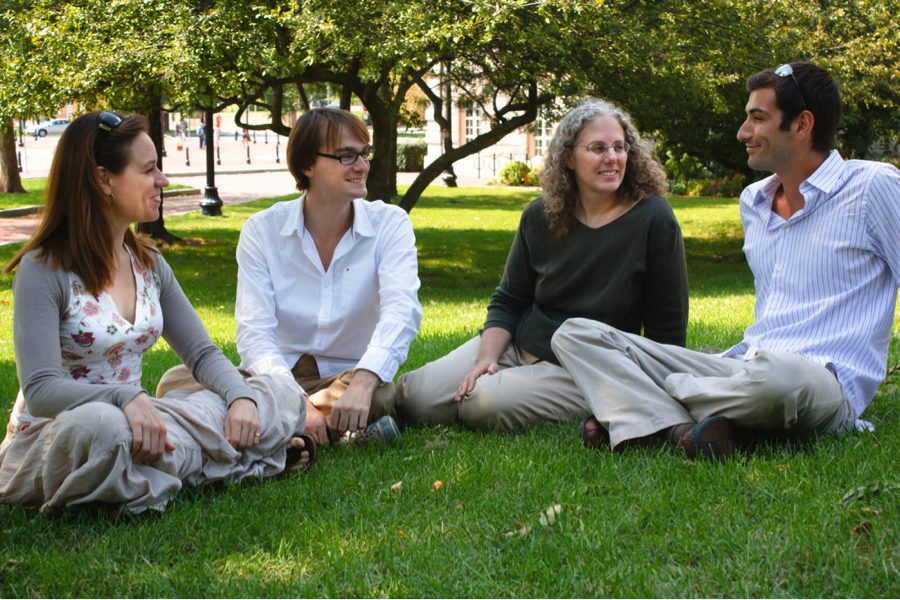“Thirty years ago my older brother, who was ten years old at the time, was trying to get a report on birds written that he’d had three months to write. [It] was due the next day. We were out at our family cabin in Bolinas, and he was at the kitchen table close to tears, surrounded by binder paper and pencils and unopened books on birds, immobilized by the hugeness of the task ahead. Then my father sat down beside him, put his arm around my brother’s shoulder, and said, ‘Bird by bird, buddy. Just take it bird by bird.”
– Anne Lamott, Bird by Bird: Some Instructions on Writing and Life
Ever been in her brother’s shoes? I’d be lying if I said I hadn’t, even in recent weeks. (Ok, it was yesterday.)
I love Lamott’s description of her brother’s immobility while facing the “hugeness” of a long put-off task; it’s a familiar experience across all ages. Avoiding daily routine and flailing under cognitive overload happens to us all: with school homework, work deadlines, exercise–even putting clothes in the hamper. In these moments of pileup, we might look back wishing we had more discipline in our daily lives.
Right now, if you look into early childhood and elementary classrooms as the new calendar year begins, you’ll likely see teachers re-creating a foundation of routine and general predictability – colorful calendars with days of the week clearly labeled, morning songs, schedules posted for the day with pockets of time for important free play.
There is more to routines than simply managing children. Research reveals the importance of patterned activity and consistent interaction in a child’s brain development.[1] It’s possible that helping young children to develop healthy habits, and to understand the value of routine, can promote their cognitive development and reduce their stress over a lifetime.
Habit in, and on, the Brain
A habit is an automatic behavior or thought that may have developed with ease or with perseverance. We might reflect and notice healthy habits in our lives, such as eating a nutritious daily breakfast ; we might feel “off” if we don’t practice our writing, dance, or other craft regularly.
We also might notice habits we’d like to change, such as waking early if usually sleeping in late, or limiting screen time if we find ourselves constantly reaching for our phone.
In research, habit learning is defined as “the acquisition of associations between stimuli and responses.”[2] In other words, behaviors that receive some kind of reward tend to be repeated, and behaviors which are not reinforced tend to be extinguished (a pattern known as operant conditioning). Habits are developed when procedures and even thoughts become more and more fixed after days, weeks, months, even years of repetition.
Experience Expectable Environments
How can we help children learn to self-manage their time and tasks–not only in childhood, but throughout adulthood? We can guide children in developing their own routines when possible.
A report by the Center of the Developing Child (CDC) at Harvard explains the importance of starting early:
“Once a particular circuitry pattern becomes established, it is difficult [but still possible] for the effects of new and different experiences to alter that architecture. This means that early experience has a unique advantage in shaping the architecture of developing brain circuits before they are fully mature and stabilized.”[3]
Research by Paro and Gloeckler (2016) emphasizes the perils that can result from inadequate structure. In their review, infants and toddlers in orphanages who lacked a predictable environment and caregiver interaction often showed deficits in speech and vocabulary, and even lower-than-average IQ scores.[1]
For this reason, they suggest that early childhood is a crucial time develop “autonomy with connectedness” by way of “experience expectable environments.” Such “experience expectable environments” may reinforce children’s anticipation and enjoyment of a sequence of events: such as arrival times, reading time, lunchtime, and playtime. Within this supportive context, children may begin making age-appropriate decisions with teacher or caregiver help about what they’d like to do with their time during free choice periods.
Freedom AND Structure
Additional research supports Paro and Gloeckler’s argument. In one study, 125 early learning settings were categorized either as “Structured-Balanced Classrooms” or “High Free-Choice Classrooms.” Children in Structured-Balanced classrooms had more chances to take part in literacy and math activities with teacher involvement, whereas children in High Free-Choice classrooms spent over ¾ of time in student-led activity and fantasy play. [4]
To ensure the validity of their research, researchers included intentionally diverse learning environments: public preschool programs, private preschools or community childcare, and licensed home-based family childcare programs.
Results showed that young children in both Structured-Balanced classrooms and Free Choice classrooms had similar results in socio-emotional learning and math reasoning scores.
However, children in Structured-Balanced classrooms involving more teacher-guided interactions also showed higher language scores. Given the importance of early vocabulary and language as predictors of lifelong learning, [5] this study is a springboard for investigating the value of Structured-Balanced classrooms, with appropriate amounts of time for free choice.
As an elementary school teacher, I often grappled with this delicate balance. How much structure is too much structure? How much free choice is too much free choice, given that I am responsible for my children’s learning and advancement to the next grade?
I found that rather than question “how much” structure or free choice, the more precise question is “when?” In the teaching world, we recognize the importance of mastery-based learning (e.g.., mastering cardinal numbers by repeated counting on a number grid) as well as unstructured exploration (e.g., freely discovering patterns on a number grid [5] click to try! I bet you’ll be surprised at what you see).
By asking ourselves when we should offer structure and free choice, we acknowledge different learning goals for our students:
(a) to unlock conceptual understanding and encourage innovation,
(b) to solidify important skill sets, or
(c) some combination of these intentions.
Free reading time can allow students to identify their own interests and make connections; teaching the skill of identifying metaphors in a story may require a more structured “I Do – We Do – You Do” lesson format.
A simple step I can take right now: ask students to recognize differing purposes in both structure and freedom during our school day, eventually supporting them in creating space for both in their personal and academic lives.
Let’s give our children the foundation to not only follow routines, but to explore and build their own. With exposure to the benefit of habit from a young age – its lower level of stress and reduction of cognitive overload – children can learn how to prioritize and enjoy meeting their own goals by living ‘bird by bird.’
1 La Paro, K., & Gloeckler, M. (2016). The Context of Child Care for Toddlers: The “Experience Expectable Environment”. Early Childhood Education Journal, 44(2), 147-153. [Paper]
2 Gasbarri, Pompili, Packard, & Tomaz. (2014). Habit learning and memory in mammals: Behavioral and neural characteristics. Neurobiology of Learning and Memory, 114, 198-208. [Paper]
3 National Scientific Council on the Developing Child (2007). The timing and quality of early experiences combine to shape brain architecture: Working paper No. 5. Retrieved from www.developingchild.harvard.edu. [Link]
4 Fuligni, Howes, Huang, Hong, & Lara-Cinisomo. (2012). Activity settings and daily routines in preschool classrooms: Diverse experiences in early learning settings for low-income children. Early Childhood Research Quarterly, 27(2), 198-209. [Paper]
5 Number Grid. Retrieved on January 1, 2017 from Eduplace.com. [Link]
 About Rina Deshpande
About Rina Deshpande 











